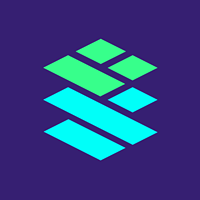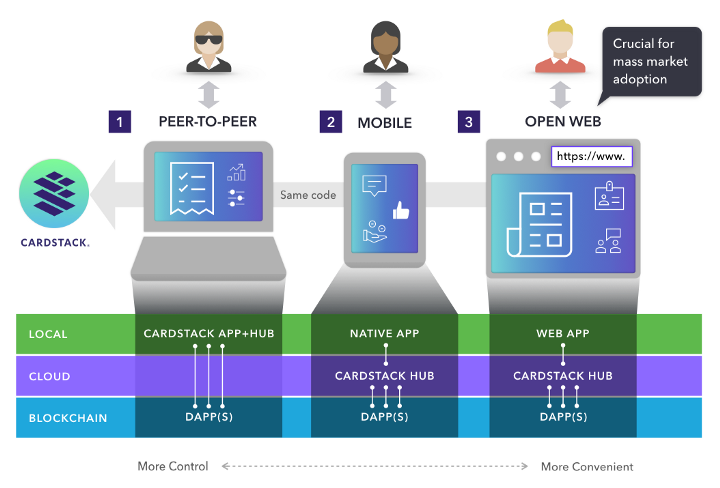CARDSTACK
CARDSTACK
Login
Digital currencies, which have gained a spectacular upward trend in recent years, are increasingly influencing the world economy. Consumers' spending habits, methods of buying and new developments in digital currencies seem to make them indispensable in the coming days. In the basic sense, it is possible to express the digital currency as a virtual concept concealed behind a set of cryptography, which is actually called "crypto money", which depends on mathematical operations, which are extremely difficult and costly to achieve. However, with the development of the Internet, purchasing decisions are increasingly moving toward the digital platform, which means that the habit of using and evaluating money is gradually shifting to the digital world, and this area has begun to lay the foundation for an economic system. In this article I will also talk about a new centralized approach that makes the block chains called Cardstack available and scalable for the mass market. For further informationYou can visit https://cardstack.attach.io .
What is Cardstack?
Cardstack is an open-source framework and consensus protocol that creates a centralized software ecosystem that can challenge today's digital superpowers, making block chains usable and scalable for the mass market.
In other words, making a leap for the block chain on every floor of the software stack, Cardstack adds a revolutionary experience that makes block chain technology usable and scalable; creates a centralized software ecosystem that can compete with digital platforms. Centralized technologies are pushing us to silo and catching the value we create. Early-centric technology, like bitcoin, promises block chaining, but it has also benefited malicious people.
Cardstack's decentralization approach allows dominant users to act as their centers; so that interactions with applications and services running on networks of different topologies flow through a software stack controlled by users.
The concepts that make up this field problem are mainly:
- The App Store period transforms software features into independent native applications; these applications generally do not communicate with each other and others want to choose from multiple features that overlap to form the workflows of the users.
- While software is floating in the cloud, users must manage multiple subscriptions to software (SaaS) products as cloud-based services and choose the right plan to optimize cost for all required features.
- The emergence of the block chain and decentralized applications (dApps) has made it difficult by requiring users to acquire and manage service symbols for each of the functions that make up the software stack.
In Cardstack's approach,
Directing vertical silos to horizontal layers, which is a layer of decentralized Internet experience, enables local applications, cloud applications, and block chaining dApps to be a future software stack that combines the best features of each approach to the software age.
In addition, the blend of decentralized Internet experience, block-chain, device and cloud-savvy users are already learning to work with multiple applications throughout their devices, clouds and block chains to fully meet their needs. Man's creativity will continue to close the gaps left by the technology.
In addition, the blend of decentralized Internet experience, block-chain, device and cloud-savvy users are already learning to work with multiple applications throughout their devices, clouds and block chains to fully meet their needs. Man's creativity will continue to close the gaps left by the technology.
Cardstack's solution in this regard is:
Cardstack is creating a new layer of experience that helps users organize their interaction in Apps (d) while keeping the collective market acceptance of epistemic centralized technologies in an open ecosystem.
In short, the new approach to orchestration should place users at the center and allow them to act like their own centers; so that the interactions with the applications and services take place via a software stack controlled by the users.
In addition, the necessary arrangement to layer the experience of the decentralized internet can be made intuitive by suggesting the next movement stream by chaining the respective cards by converting each state of an application into a visual arrangement of the relevant information.
The process of centralizing the software ecosystem behind the stack of cards that experience the experience of the centralized internet can be done piecemeal by allowing common cloud services to be changed when ready to replace block chains.
Cardstack Features
With Cardstack, end users can mix and match features from multiple applications or DAPPs without worrying about the complexity of separate cloud subscriptions or service markers. Even more exciting: the system allows users to design incredibly new workflows to participate in services from different layers of the Internet; this would not have been possible in a centralized world.
The present invention is made possible by the associative design paradigm that makes Cardstack into expandable, embedded, embedded, chained, triggered, versioned, cloned, approved, revoked, or forever recorded units into a piece of encapsulated cards. In a decentralized world, your data must be networked or sovereign as you wish.
Developers can use Cardstack Framework, a comprehensive SDK to create powerful, card-based blockage applications. Build anything using modular stories and discovery containers. Easily create custom workflows using the Cardstack Hub, which organizes data and value transfer across multiple block chains and clouds. Use prebuilt functions such as searchable indexes, real-time notifications, uniform user permissions, flexible container distribution, and much more. Everything is expandable and 100% open source.
This ecosystem is governed by intelligent contracts supported by Cardstack Token (CARD), an ERC20 indicator with an Ethereum base. CARD is not just an old cryptography: It is specially designed to create a sustainable marketplace where open source developers are highly rewarded, allowing users to cull and combine the perfect mix of software services that fit their needs.
When a user uses CARD, he creates smart contracts between the user and selected applications before entering the prize pool. Based on the anonymized usage data tracked by the smart contracts, the collected icons are then regularly distributed to the creators and contributors of the application in accordance with a dynamic algorithmic payment and governance model in the hands of the community.
Like other crypto currencies, CARD users can be miners to verify transactions and earn wages. However, unlike Bitcoin, which forces miners to solve math problems that do not work, Cardstack analytical miners make the system fair and flexible by helping to calculate the reward function of who pays whatever it takes to produce unwanted mail. Analytical miners' results compete in a ranking scheme called analytical proof, so the award algorithms are never under the control of a single party.
Advantages of Cardstuck
- For end users
- Mix and match multiple dApps and cloud apps
- Create stunning new workflow and application combinations using Cardstack Hub
- Use a token (CST) that makes the retaining agreements with all the services you need
- Let your data dominate or easily reach anywhere with our card-based user experience
- Quickly start in Fiat currency: no cryptographic expertise required
- For developers
- Use the comprehensive SDK to create powerful, beautiful, extensible applications
- Access a deep library of powerful pop-up functionality
- Improve your application experience using Cardstack off-chain aggregation
- It is paid fairly by the Community-operated payment and governance algorithm.
- Get a refund for your material costs.
- Keep things 100% open source.
- For analytic miners
- Do useful work on algorithm-driven empowerment, which provides a fair distribution of wealth
- Help protect the system from extremes, malicious actors and spam
- Charge as eBoard Cards that can be rolled back into the eco system
- To be compensated by a ranking scheme that blocks the only parties controlling the award function
Cardstack Technology
Cardstack provides a set of tools that unlock the potential of the decentralized Internet for everyone - a leap for the block chain on every floor of the software stack.
App Frame
Cardstack Framework is a comprehensive SDK for creating powerful, consistent blocking applications. Basically, there is a Cardstack Hub that organizes data and value transfer on multiple block chains and clouds.
The negotiation protocol
Cardstack-powered dApps can touch the Tally protocol, which gives daPPs the power to make complex calculations to organize large user networks, such as collecting payments, counting votes and rewarding good work.
Ecosystem Token
Developers can earn Cardstack-based applications through smart contracts supported by the Cardstack Token (CST), an ERC20 symbol based on Ethereum, designed to fairly reward Cardstack-based communities.
Cardstack Token Promotion
It is a catalyst for a global movement toward a sustainable software market built on open source code supported by the crypto-economy. The details of the Cardstack Token are under the last review and will be published shortly. This includes information about pre-allocation criteria and the crowded fundraising mechanism.
Team
- Below you can find valuable team and valuable experience of this project. You can read white paper for more detailed information. ( https://cardstack.com/whitepaper-pdf )
- CHRIS TSE
Chairman of Founder and Product Card Project • Founding Partners, Monegraph & Dot Blockchain Media • Previously: R & D Presidency, McGraw-Hill E-Labs; DR. Innovation, Business World • University of Columbia, BSc in Computer Science
- ED FAULKNER
Lead Developer, Card Bar Project • Bullion Core Team Member • Liquid Fire Creator • Previously: MIT Media Lab; Akamai • MS in Computer Science
- FINE ABDEL-RAHMAN
Sr. Blockchain Developer, Cardstack Project and Monegraph • Previously: McGraw-Hill Education; Sun Microsystems • Mathematics and Computer Science BSc, Colorado School of Mines
- JUSTIN THONG
Data Scientist, Card Stack Project • Written by the author entitled "Proportional Citation and Allocation Model" • Mathematics in Mathematics (First Class Honor) Andrews University
- KEN ROSSI
Lead UX, Kart Bar Project • Previous: USTA / US Open Creative Director • BA, John Jay College, New York City University
- CHRIS GARDELLA
Lead Designer, Cardstack Project, Monegraph & Dot Blockchain Music • Previously: Huge; R / GA; Area 17; Apple • Graphic Design BA, University of Michigan
- WILL BAGBY
Sr. Developer, Cardstack Project & Monegraph • Previously: Bloomberg LP • New York City University Computer Science BSc
- AARON SIKES
Sr. Developer, Cardstack Project • Previously: Shipyard; MOT; HubSpot; hedgeserv
- ISLA BELL MURRAY
Interaction Designer and Producer, Cardstack Project • Previously: Hustle and bustle; Bold Italic; Finding • Edinburgh University, Psychology BSc
- VENKAT DINAVAHI
Contributing Developer, Cardstack Project • Previously: Coderly; WhoWentOut • MSc in Management Science and Engineering, Stanford University; BSc in Computer Engineering, University of Maryland
- ALEX SPELLER
Contributing Developer, Cardstack Project • Previously: Natural Broadcast Group • University of Birmingham Scientific Intelligence and Computer Science BSc
- MAXIMILLIAN KIRCHOFF
Interaction Designer and Producer, Cardstack Project • Previously: ADP; Google; Bold Italic
- BALINT ERDI
Contributing Developer, Cardstack Project • Rock and Roll Magazine with Ember • Budapest University of Technology and Economics University, Master of Information Technology
- STEVE BOBROV
Sr QA Engineer, CardBar Project • Previously: BusinessWeek; Bear Stearns; Citigroup • BS in Computer Science and Psychology, Stony Brook University
- KATRIN NUSSHOLD
Card Stud Project • Previously: Pluto Vermögensverwaltung GmbH • English at University University, MA; BA in English Language and Literature, Columbia University
- JACQUELINE THONG
Operations Manager, Card Stack Project • Previously: Vestadia International; Advisoray • Columbia University Sustainable Development and Economics BA
- ANNE WRIGHT
Activist, Cardstack Live • Previous: World Women's Media / Tina Brown Live Media; NBA Entertainment • Middlebury College Antique History BA
References
For more detailed information, please visit the following websites.
- https://cardstack.com/
- https://medium.com/cardstack
- https://t.me/cardstack .
- https://cardstack.com/whitepaper-pdf
- https://facebook.com/cardstackproject
- https://bitcointalk.org/index.php?topic=2805234.new#new
- https://telegram.me/cardstack
- https://github.com/cardstack/cardstack
- https://twitter.com/cardstack
Author : rawon ayam
https://bitcointalk.org/index.php?action=profile;u=1397196




Comments
Post a Comment